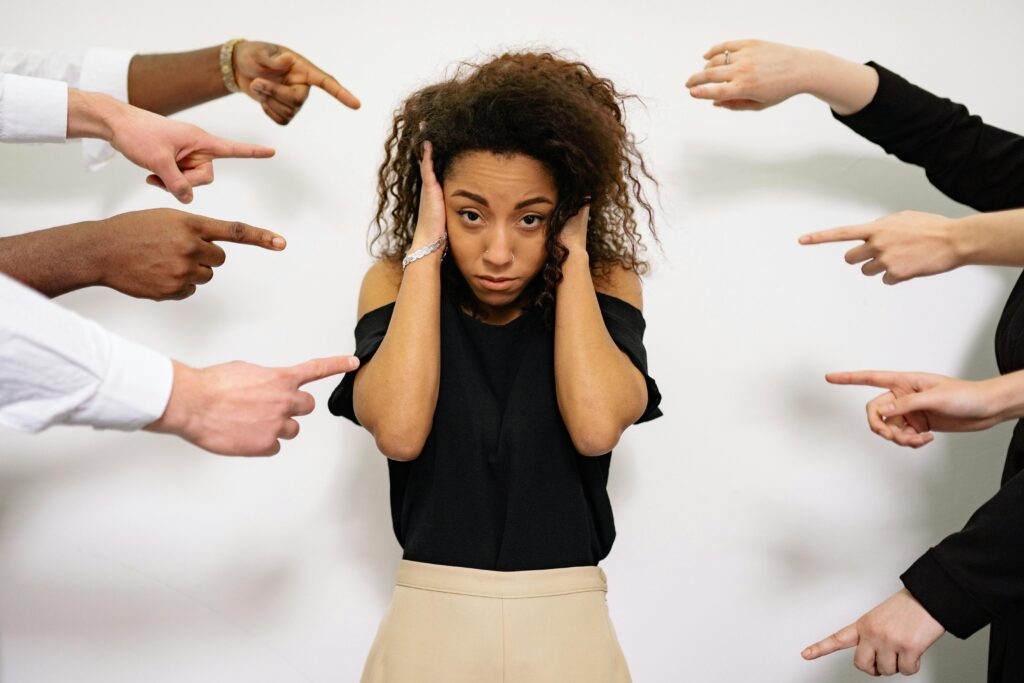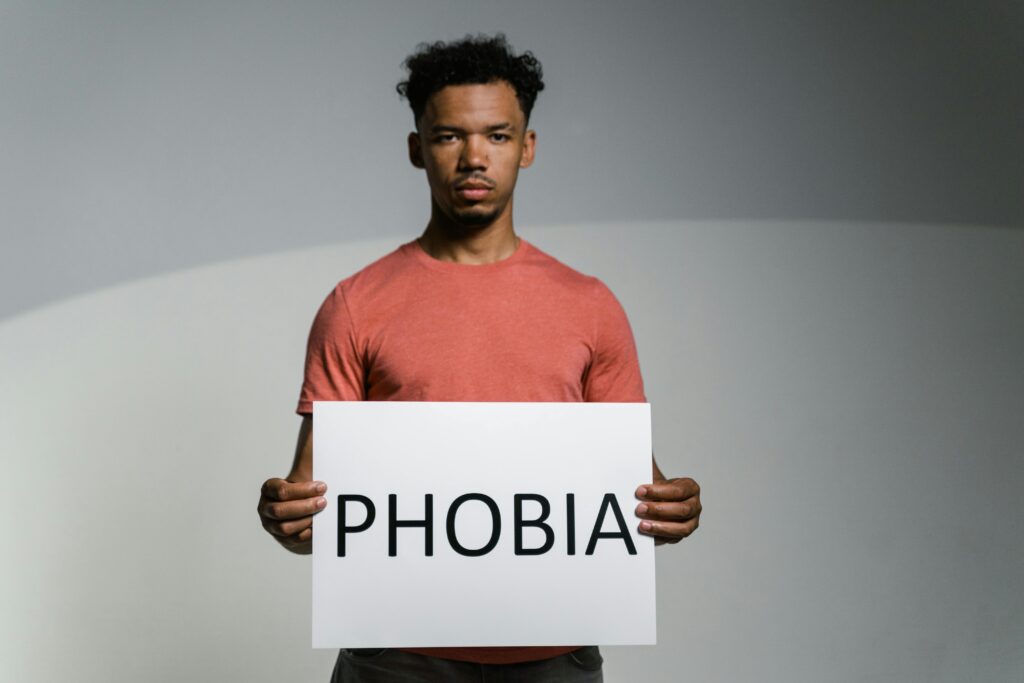You were invited to a party, and for some reason, the idea of speaking to a person causes you to flush in your palms.
In a meeting, you memorize your line a hundred times and when the time comes, you get conscious. Functions that would otherwise be taken lightly like the ordering of a coffee or making a phone call would be something so difficult to do just like a mountain climbing venture.
If this sounds familiar, you’re not alone as you’re likely to be suffering from Social anxiety or Social phobia.
This is one of the most prevalent disorders in the world, which transforms the majority of social encounters into a thrilling experience. But here’s the good news: social anxiety is treatable and it is possible to overcome fear of social events and gatherings as a result of developing the right techniques.
In this content, we will be discussing how to overcome social anxiety. By the end of this content, you should have total control on your anxiety.
What Is Social Anxiety?

Social anxiety cannot be synonymous with shyness, as a person is afraid of being judged and evaluated by others.
It usually involves the stark fear of being viewed or looked at, or being embarrassed or wanting to avoid such things. This fear ultimately results in avoidance, social isolation and experiencing substantial distress.
Common symptoms include:
– Fear of social situations and blushing, sweating, trembling or rapid heartbeat.
– Non-recognition or fleeing from an individual.
– Replaying prior communication or anticipating the next one.
– Isolating feelings like feeling out of place, too big, too loud, too little, too quiet.
What Causes Social Anxiety?
In order to eliminate these symptoms, it is necessary to know them first. Social anxiety can stem from various factors:
– Biology: It may be caused by genetic factors and chemistry of the brain.
– Past Experiences: Hearse trauma that can result from bullying, criticism or even any other traumatic event may leave deformation that’s why.
– Perfectionism: The desire to meet very high expectations is the main driver of anxiety.
– Learned Behavior: It can be a result of a childhood in excessively critical or stressful environments.
As a result, you’re able to treat your anxiety better by going to the source of the problem.
12 Ways On How to Overcome Social Anxiety

The following are 12 steps you can take to reduce or conquer social anxiety:
1. Understand Your Triggers
Knowing where and when your social anxiety occurs is very important. Is it speaking in public? Meeting new people? Being in large crowds?
Write a diary, this should be done so as to document circumstances that make one anxious.
While general triggers may point to generalized coping strategies, very specific things are likely to be addressed in that way, so once key triggers are known, the development of specific coping strategies can be considered.
2. Practice Deep Breathing
Anxiety provokes the well-known ‘fight or flight’ reaction that makes your heart race as if you‘re out of control. Deep breathing can help you calm your nervous system.
This means, breathe in through the mouth for four seconds. Swallow a mouthful of saliva and hold it for 4 seconds. Take six seconds expiratory phase to expire out of the mouth.
This technique should be done daily and mostly before interacting with others.
3. Challenge Negative Thoughts
Social anxiety feeds on negative thoughts and comments, such things as “what if others take me as being strange?” Or “What if I stumble while speaking?”
Reframe these thoughts with positive ones or things like: “Having said that, is there any proof to back up this? “What can turn out badly, and how do I deal with that?” Can I pass the same sentiments towards other people the same way I pass it to my own self?
With time, you are able to challenge these thoughts and thus construct a healthier and censored way of thinking.
4. Start slow and steady
Step by step should be the best way to begin by gradually stretching one’s comfort zone. Fighting social phobia doesn’t necessarily mean you should suddenly jump into a huge party. Instead, start small:
– Greet a neighbor.
– Consolidate other activities like that involving you ordering food at a Café or coffee at a coffee shop.
– Attend a support group, such as a book club that is limited in the number of its members and then grow from there.
Ease into this approach and enjoy the small wins, before steadily raising the stakes in terms of the social encounters you’re exposing yourself to.
5. Prepare for Social Situations
It is therefore quite clear that preparation decreases anxiety. For example, when planning a topic, It is worthwhile to consider some conversation openers or questions to ask someone.
Practice scenarios, act it out with a friend or a family member to get the best results. Visualize success, as you read the passage, try to picture the scene and then you respond to it.
It makes you feel you are in charge and not overwhelmed by tasks that you are required to accomplish.
6. Focus on Others, Not Yourself
Most times, social anxiety is caused by self-consciousness. Shift your focus outward, pay close attention to the other people’s words and ideas.
Maintain eye contact as much as possible so as not to look Dyfan directly in the eye. Avoid affirmative questions but ask probing questions that will show the interviewer that you are engaged by Dyfan’s responses.
Well, again, people have their own problems to solve and most likely won’t care about your appearance.
Such a change is useful to reduce the load and build real relationships.
7. Limit Avoidance
Minimizing exposure that elicits social anxiety might offer momentary escape, but maintains anxiety in the long run. Gradually expose yourself to feared situations using these steps:
Begin with the easier situations.
Always make sure to celebrate victories over fear.
It is as important to remember what went well or well enough even if it wasn’t as pretty a picture as one would have liked.
In the long term, simple exposure lessens the anxiety felt when in social relations with other people.

Read More
How to Overcome Breakup
How to Overcome Anxiety
8. Embrace Imperfection
It’s actually nice to know nobody wants you to be perfect and attempting to be so only puts more stress. Remind yourself.
There is nothing wrong with tripping while talking or getting some words wrong, for instance.
Might makes you human and can be easily identified with.
Competing imperatively yields individuals to approach social situations with so much less fear than when being more authentic.
9. Practice Self-Compassion
A very important advice is being gentle to the self during anxiety. Instead of criticizing yourself, try saying:
“It’s perfectly fine to have that feeling; I am trying my hardest.”
“It was only one awkward moment, and it doesn’t matter who or what made me that way.”
Self-compassion relieves the feeling of shame that is usually linked to social anxiety, therefore allows one to get past it.
10. Use Visualization Techniques
Visualization can help you feel more confident. They apply, let yourself imagine that you are in a particular social setting and that you are totally relaxed.
Try to think the best, such as friendly exchanges or kind interactions.
Practice allows yourself to change your mind at a subconscious level, when you stop identifying social events with stress and start identifying it with success.
11. Seek Support When Needed
You don’t have to go through social anxiety all by yourself. It would also help if you could join support groups so you can interact with other people.
What is it that people with social anxiety disorder can do, like going for therapy sessions; CBT is one of the most efficient forms of treatment for social anxiety.
Turning to other recommendations or sources in the World Wide Web.
Sometimes it is important to let someone else know what you are going through and this is a sign of strength not weakness.
12. Celebrate Progress
This means that much of the change we seek may come inch by inch instead of mile by mile. It can be as simple as starting a conversation or attending a meeting – each win should be embraced. Writing your self-development plan is useful for the development of confidence and motivation to keep on going.
Other Helpful Tips On How to Overcome Social Anxiety
– Mindfulness Practices: It can be done through the common practices such as meditation, or practicing yoga, or practicing prayer, among other procedures.
– Books to Explore: Book recommendations may stem from books such as ‘The Anxiety and Phobia Workbook,’ ‘Dare: The New Way to End Anxiety.’
– Apps: Sites such as Calm, BetterHelp, or MoodPath include materials that can help learners deal with anxiety.
Conclusion
Conquering social anxiety is a process, but I really do believe that it is a worthwhile process. Every action you make practically lays down the groundwork for a new, better, and brighter you.
But hey, always know you’re not on your own and even the most anxiety-filled encounter is a learning experience. Eventually the world shall be conquered if one is patient enough and persevering all the moments shall give way for a comforting touch.
Good luck, get out there and do your best.
